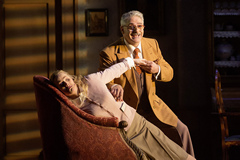| Opera Reviews | 8 May 2024 |
Paisiello's Barber proves to be an effervescent treatby Moore Parker |
|
| Paisiello: Il barbiere di Siviglia Theater an der Wien 25 February 2015 |
|
|
Updated to the 1940’s, Christian Fenouillat’s staging fully utlises the theatre’s available depth, replacing any vertical perspectives in the action by an invisible horizontal divide providing an upstage street area for the opening and closing scenes, which disappears as the main set - a lavishly filled salon - rolls forward to the footlights for the main body of the opera. Claustrophobically bourgeois with a stylistic potpourri of furnishings (including two dominant crucifixes), this is a credible dwelling for the thematic material - ideally complimented by Agostina Cavalca’s matching costumes of sedate colours, with a sensible cardigan, pleated skirt, and white ankle socks for Rosina. Easily a setting for any Ibsen classic! The production team have skillfully created both endearing and amusing characters, full of minutely-studied idiosyncrasies and unexpected dimension. This Bartolo (no one-dimensional buffo) actually attempts suicide when the fates turn against him and indeed - in the talented hands of Pietro Spagnoli - fulfils the work’s demand to become the dominant figure of the evening. Masterful in expression and with an acute sense of comic timing to compliment his vibrant baritone, this reading was an absolute delight, not least in the hilarious Act 2 “Seguidilla” which had the house bubbling with amusement. Fulvio Bettini, is a delicious money-grabbing Basilio - pan-faced with a French beret, horn-rimmed spectacles, and oodles of stage presence - plus ample vocal substance to steal the show in his solo scenes. The cast is convincingly divided in generation, with the younger members well fulfilling their tasks - while not quite reaching the heights of their seniors. All juniors, incidentally, are familiar to the house from earlier productions at the Theater an der Wien. Andrè Schuen gave a sprightly, well-paced, Figaro - showing obvious potential for growth in vocal dimension and stagecraft with future maturity. As Rosina, Mari Eriksmoen presented a credible, sympathetic - if slightly cool - figure whose vocal strengths lay more in lyricism (a lovely Act 1 cavatina) than the occasional lunging flights to the limits of her upper register. Topi Lehtipuu was more impressive in his guises as soldier and music teacher than as the romantic lyricist, both vocally and in demeanour. Erik Årman (La Giovenetta/Un alcade) and Christoph Seidl (Lo Svegliato/Un notaro) delivered delightful little cameos in their respective parts. The true revelation of the evening came from the Freiburger Barockorchester, under the masterful direction of René Jacobs who opted for Paisiello’s original 1782 St. Petersburg version. Effervescent, full of tension, precision and subtlety from the first chord through to the finale - with a seamless flow between recitativi (superb Basso continuo work by Sebastian Wienand, fortepiano; Stefan Mühleisen, cello; and Mauro Squillante , baroque guitar/mandoline) and the set pieces - this was a truly memorable reading. A nice touch in the finale: although deprived of his ward as a bride, Bartolo evidently finds some solace in the company of a sprightly wire-haired Dachshund who brings down the curtain with his new master.
|
|
| Text ©
Moore Parker Photo © Theater an der Wien / Herwig Prammer |

 Regrettably neglected, (some three decades have passed since Vienna’s last production at the city’s Kammeroper) Paisiello’s milestone setting of Beaumarchais’ famous material can boast luxurious treatment in this new Theater an der Wien production by Moshe Leiser and Patrice Caurier, with René Jacobs at the musical helm.
Regrettably neglected, (some three decades have passed since Vienna’s last production at the city’s Kammeroper) Paisiello’s milestone setting of Beaumarchais’ famous material can boast luxurious treatment in this new Theater an der Wien production by Moshe Leiser and Patrice Caurier, with René Jacobs at the musical helm.





